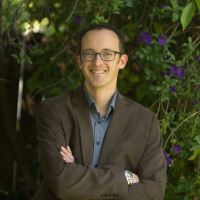Commentary on 1 Thessalonians 3:9-13
One of the hallmarks of western culture is the ideal of “rugged individualism.” It might be one of our chief exports to the rest of the world as well. Sown in the fields of European expansion around the globe, this focus on the individual has borne its fruit in everything from entrepreneurship to weakened family ties to relentless pursuit of political freedoms.
It has profoundly shaped our religious practices as well. The Great Awakenings that swept the English-speaking world in the eighteenth and nineteenth centuries helped craft an expression of Christianity in which the individual’s response to the gospel message is paramount, the defining reality of faith and practice.
For those of us who have been deeply schooled in the pursuit of a “personal relationship with Christ,” New Testament depictions of our radical interdependence on one another can come as a shock. The biblical writers insist that our experience of God is so wedded to our experience of other followers of Jesus that, however personal our relationship may be, it could never be considered private or even individualistic.
We depend on each other. Even in our relationship to God. Even for our connection to Jesus.
Divine joy
In 1 Thessalonians 3:9–10 Paul expresses the profound joy that undergirds his praise of God. Here, the source of his joy is not his personal relationship with Jesus. It’s the ongoing faith of the Thessalonian church. Paul had said in verse 8 that this was the source of his life: “For now we live, if you continue to stand firm in the Lord” (NRSV). Here, that faith is the source of Paul’s joy and gratitude before God: we feel joy before our God because of you (verse 9).
As we go through the Advent season joy will be a recurring theme. We will remember that the angels proclaimed “glad tidings of great joy” to the shepherds (Luke 2:10). We will sing of these “tidings of comfort and joy,” and the “joy to the world” that comes with Christ’s arrival.
First Thessalonians 3 reminds us that the church is the body of the Christ who has arrived. We are the source of one another’s joy. We are the body of the savior, the ongoing presence of the One who was to come, who has come, and who will come again. You and I, together, are an appropriate subject matter for unceasing joy before God for one another. The ongoing faith of the Church, together, is testimony to the ongoing faithfulness of God in reconciling humanity to Godself through Jesus.
Paul goes on to express his hope that he and his companions will be able to return to Thessalonica and “restore whatever is lacking” in their faith (verse 10). In verses 8–9 faith is the source of Paul’s rejoicing before God, here it is what he hopes to fill up. Human limitations, incompleteness, imperfection—none of these are reasons to sideline what the community gives to us as reasons to rejoice before God. The Thessalonians’ faith is incomplete. And it is a source of joy and celebration. We rejoice not because something is one hundred percent complete and perfect. We rejoice because God is at work.
Advent is like this as well. We celebrate the arrival of Jesus. And at the same time we stir up our longing for Jesus to come again, because the work is not finished. The world is not completely restored. We are all called to restore what is lacking until God makes the blessings of Christ known “far as the curse is found.” We celebrate, we rejoice, even in the work that is not yet complete. Even in the incomplete work of God in our sisters and brothers.
The tie that binds
In 1 Thessalonians 3:11–13 Paul morphs into a prayer of blessing. He expresses his hopes for himself and the Thessalonian church. It’s a prayer lined with advent, woven with holiness, and stitched together with love.
First, Paul prays for advent. For his own advent, and that of his team to the Thessalonians. Hearing about their faith is a source of joy, and he expresses his desire to return and have his joy increase before God. The prayer draws a line between this hope for a return and Paul’s hopes for Jesus’ own arrival. Look closely at that second arrival and you’ll see that it, too, is a manifestation of Christian community—not individualism. Jesus comes “with all his saints” (verse 13).
Christ does not appear without his body. It comes with him. It is the embodiment of his glory (which is God’s glory). Our individualism must fade in the bright light of such a communal identity! In order for us to be prepared for such an advent of Christ we must become the sort of people who begin reflecting the glory of God here and now.
Second, then, Paul prays for the community to be stitched together with love. Community again. There is no love without there being both a lover and a beloved. It is literally impossible to fulfill the greatest commandments (love God, love neighbor) on our own. We cannot live a life pleasing to God by turning all our attention heavenward.
During Advent we remember the arrival of love and look for its fresh arrival. When we love, we are Jesus to one another. We are the advent of God’s love. We are its incarnation. To be loved by the body of Christ is to be loved by Christ himself.
And don’t forget: this love is not just in-house. It is “for one another and for all” (verse 12). Love your neighbor. Yes, but who is my neighbor? The scribe asked this of Jesus and got the parable of the Good Samaritan in reply. To be a neighbor is, simply, to be the one who loves. Not the one who passes by, reserving piety for those who belong to our own particular tribe.
Third, Paul prays for holiness. To stand in the presence of The Holy when Jesus comes with his “holy ones” (that’s what “saints” means, verse 13), the people have to be holy as well. The greatest mistake the church makes, again and again, is separating holiness from love. Holiness is the manifestation of the love of God as we love both God and neighbor. As 1 John says, no one who does not love his sibling, whom he can see, can love God, whom he cannot see. We do not prepare ourselves for the arrival of Jesus by ridding our communities of those we deem unworthy. Instead, we create holiness through acts of love even toward those whom we would otherwise think are outside the pale of God’s people.
This, too, is the story of Advent. It’s God’s story. The good news offered to the shepherds “shall be to all people.” All the nations. The gentiles. The unclean. The uncircumcised. The violators of God’s Law.
This is the love that has already appeared once, and whose advent we await again.
This is the tie that binds God to us and us to one another.


November 28, 2021